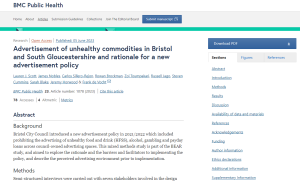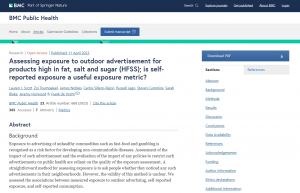Advertising unhealthy commodities – rationale for a new advertisement policy
8 June 2023
Younger people and those living in more deprived areas are more likely to report seeing unhealthy product advertisements, particularly for unhealthy food and drinks, according to research published in BMC Public Health. This means that policies specifically restricting such advertisements may have the potential to reduce health inequalities.
Outdoor public spaces such as bus stops and billboards are important locations for ads because many people see them. In 2021 Bristol became the first city outside London to restrict advertisements for high fat, salt and sugar products on advertising space owned by the council. In addition to this Bristol’s restrictions also extended to ads for alcohol, gambling and payday loans.
Researchers working on the Bristol Evaluation of Advertising Restrictions (BEAR) Study surveyed residents in Bristol and South Gloucestershire between January and March 2022 to assess advertising exposure before the policy was put in place. They also interviewed council staff and people from voluntary sector organisations who had been involved in developing it.
The study team wanted to explore what people thought of the policy and any potential barriers to its implementation. Further, they wanted to know what unhealthy outdoor advertising residents noticed, and what products they consumed.
They found that 58 per cent of the people in Bristol and South Gloucestershire who responded to the questionnaire reported seeing advertisements for unhealthy products in the week before they were asked to complete it. This was highest for high fat, salt and sugar foods (40 per cent).
Sixteen per cent of residents reported seeing advertisements for high fat, salt and sugar foods appealing specifically to children. For these products in particular, younger people were more likely to report seeing adverts than older people. Those living in more deprived areas were also more likely to come across this type of advertising.
Council staff and others involved in developing the policy felt that the climate around its introduction in Bristol was broadly supportive. They also believed that building a case for this policy was easier because of the work previously done in London.
However, they were concerned about the relatively small proportion of council-owned advertising space as a factor that could limit the reach of restrictions. They also mentioned other objectives, such as promoting Bristol’s economy through festivals, as potentially being at odds with policy aims.
As part of the evaluation researchers also visited advertising sites listed on the council’s database to carry out an audit of what was being displayed there. Doing this allowed them to compare data from their audit against what surveyed residents had reported seeing. Both measures were aimed at estimating levels of exposure to advertising and allowed the study team to assess whether asking people to self-report on this type of exposure might be a useful methodology for future studies.
Lauren Scott, lead author, said:
“Our findings corroborate previous evidence from other areas indicating that young people and people living in lower socio-economic areas are exposed to, or observe, more advertising of high salt, fat and sugar products. At the same time, we saw less evidence of such a correlation for other unhealthy commodities notably alcohol, gambling and payday loan advertisements.
“An advertisement policy that restricts the advertisement of such unhealthy products has the potential to have a bigger impact on less-advantaged groups. Thus, it has the potential to reduce health inequalities.”
Professor Frank de Vocht, project lead, said:
“We recognise exposure to unhealthy commodity advertisements as a modifiable risk factor when it comes to the development of non-communicable diseases. The World Health Organization has identified this as a priority area for policy action, particularly for alcohol and tobacco as well as the marketing of foods and non-alcoholic beverages to children and adolescents.
“Evidence from modelling studies suggests that restricting advertising can lead to reductions in how many of these products people buy and consume. This rationale directly influenced the development of the advertisement policy in Bristol, while the implementation of the policy benefitted from a supportive environment following the ‘health in all policies’ initiative and a focus on reducing health inequalities across the city.”
Paper

Advertisement of unhealthy commodities in Bristol and South Gloucestershire and rationale for a new advertisement policy
Download the paperAdditional papers
